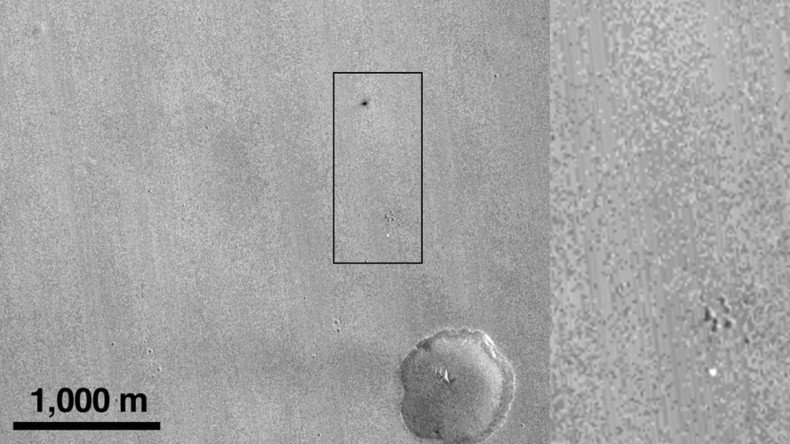Lost Mars lander fell 2-4 km, destroyed on impact – NASA images

Schiaparelli, the landing craft from the European Space Agency’s Exomars probe, which went missing earlier this week near the surface of Mars, has apparently been destroyed, according to new data.
The ESA craft fell to the Mars surface from a height of 2 to 4 kilometers (1.2 to 2.5 miles), the agency said on Friday. The disc-shaped spacecraft, which weighed 577 kilos (1,272 lb) was destroyed on impact.
Data sent from @ESA_EDM & recorded by @ESA_TGO are providing gr8 info on the lander's test descent #ExoMarshttps://t.co/wineEVCGiZpic.twitter.com/ihLl39Jo18
— ESA Operations (@esaoperations) October 21, 2016
The lander's failed mission was confirmed by images taken by NASA's Mars Reconnaissance Orbiter passing above the landing site.
Earlier this week, the ESA declared its ExoMars 2016 mission a success, despite losing contact with Schiaparelli just before its expected landing time.
With the "new markings on the surface of the Red Planet" captured by NASA’s Mars Reconnaissance Orbiter believed to be the Schiaparelli EDM (Entry, Descent and Landing Demonstrator Module), the European agency is now analyzing data recorded by the lander's mothership, the Trace Gas Orbiter (TGO), to understand what went wrong.
Colliding with the planet's surface at a speed greater than 300 km/h (186 mph), the lander could have also exploded on impact, the ESA said, explaining that its "thruster propellant tanks were likely still full."
Remnants of what is believed to be the lander's large, bright parachute, as well as a "fuzzy dark patch" which might be the destroyed Schiaparelli module itself, could be seen on NASA images taken Thursday.
The two "features" were absent from the Mars surface on earlier images taken by the same camera.
Meanwhile, I’m on a neat orbit that takes me around #Mars in 4.2 days. Planning to take some #science calibration data in Nov 2016! #ExoMarshttps://t.co/0tWiGg1hTN
— ExoMars orbiter (@ESA_TGO) October 21, 2016
The Schiaparelli lander contained only basic equipment. Its TGO mothership, which is designed to search for "evidence of gases of possible biological importance," is still safely in orbit.












